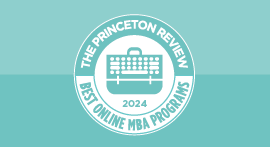An MBA can be a great investment in your career, accelerating your trajectory or solidifying your role at your current company. But it's important to know all the facts before you apply. Take a look at these MBA facts, statistics, and resources to get started.

1. What's unique about the value of an MBA?
Certain industries, such consumer marketing, corporate finance, and commercial banking, now expect or even require an MBA for promotion to more senior positions. An MBA can accelerate your career prospects, whatever the industry, and can set you apart from other job seekers, especially during an economic downturn.
2. An MBA can increase your salary.
MBA alumni who left positions with salaries around $50,000 to start full-time programs saw an 80% increase in their salaries upon graduation, based on a recent survey by Bloomberg Businessweek survey. Learn more about the ROI of an MBA degree.
3. Your MBA concentration can be lucrative.
Unsure what your MBA concentration might be? Strategy, entrepreneurship, marketing management, finance, and economics concentrations rank highest among post-graduation salaries, according to The Atlantic.
4. Research the most in-demand fields for MBAs.
According to a March 2017 U.S. News & World Report article, MBA students should consider the health and medical fields, accounting, finance, compliance and regulatory roles, as well as operations and supply chain management, when it comes to jobs post-graduation.
5. The experience levels of MBA applicants varies.
Worried about being too young or too old to pursue an MBA? Don't be: EMBA, Global MBA, and Early Career MBA programs are offered by many schools to meet you where your career is today. Learn more about different types of MBA programs.
6. Choose the right program for your needs.
A full-time MBA isn't your only option: there are highly respected part-time and online MBA programs across the country and around the world. Students may find the cost, structure, and practicum of these part-time programs are more aligned with their needs than full-time programs.
7. Many MBA programs take both GMAT and GRE scores.
Almost all MBA programs require recent GMAT or GRE scores. Test prep programs and courses are a good investment to bolster your scores and put you in the mindset of a student again.
Read More: Quiz: Should You Take the GMAT or GRE?
8. Consider the cost of your MBA degree.
Have you considered the cost of earning your MBA? Full-time MBA students can expect to pay at least $100,000 for their two years of study as well as day-to-day expenses. Depending on your program, however, there may be more to this number.
9. A great program reputation doesn't always mean a great fit.
MBA programs aren't all about the brand name. When browsing schools, consider faculty reputation, teaching methodologies, alumni connections, and more. Learn more about how to use MBA rankings.
Find Your Business School
Search MBA programs by tuition, state, size, and more to find your best fit.
Read More

Find MBA Programs Matched to Your Interests
Explore our featured business schools to find those that are looking for students like you.

Top Online MBA Programs
On a mission to increase your salary? Our Top 50 Online MBA ranking is based on academics, career outcomes, tech platforms, and more.

Best Career Prospects
Find out which schools have the best track records for getting students jobs—and the highest starting salaries.

Top Schools for Entrepreneurship
Ready to build your own business from the ground up? Check out these 50 graduate programs.

Find MBA Programs Matched to Your Interests
Explore our featured business schools to find those that are looking for students like you.

Top Online MBA Programs
On a mission to increase your salary? Our Top 50 Online MBA ranking is based on academics, career outcomes, tech platforms, and more.

Best Career Prospects
Find out which schools have the best track records for getting students jobs—and the highest starting salaries.

Top Schools for Entrepreneurship
Ready to build your own business from the ground up? Check out these 50 graduate programs.

Find MBA Programs Matched to Your Interests
Explore our featured business schools to find those that are looking for students like you.

Top Online MBA Programs
On a mission to increase your salary? Our Top 50 Online MBA ranking is based on academics, career outcomes, tech platforms, and more.

Best Career Prospects
Find out which schools have the best track records for getting students jobs—and the highest starting salaries.

Top Schools for Entrepreneurship
Ready to build your own business from the ground up? Check out these 50 graduate programs.



